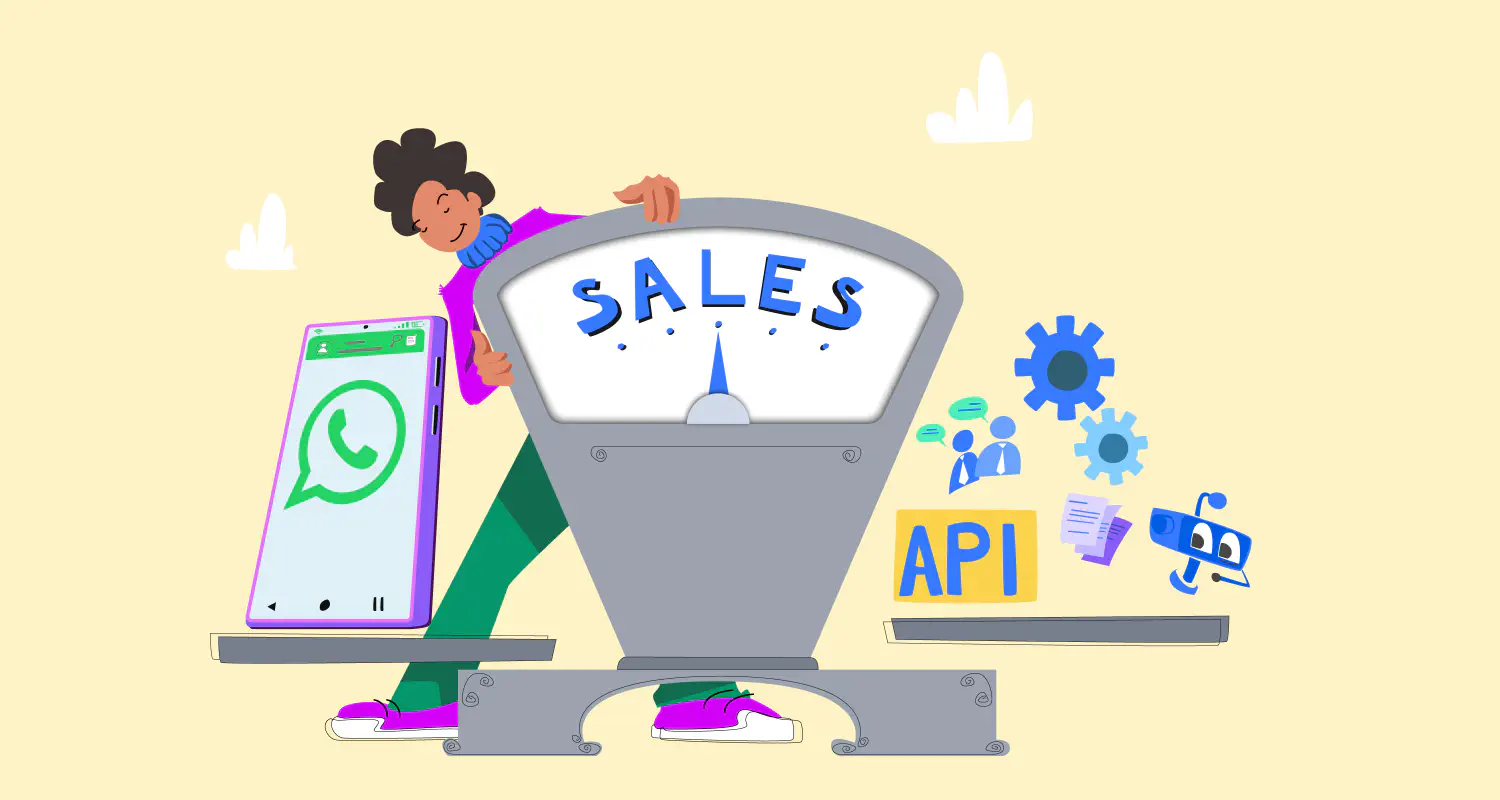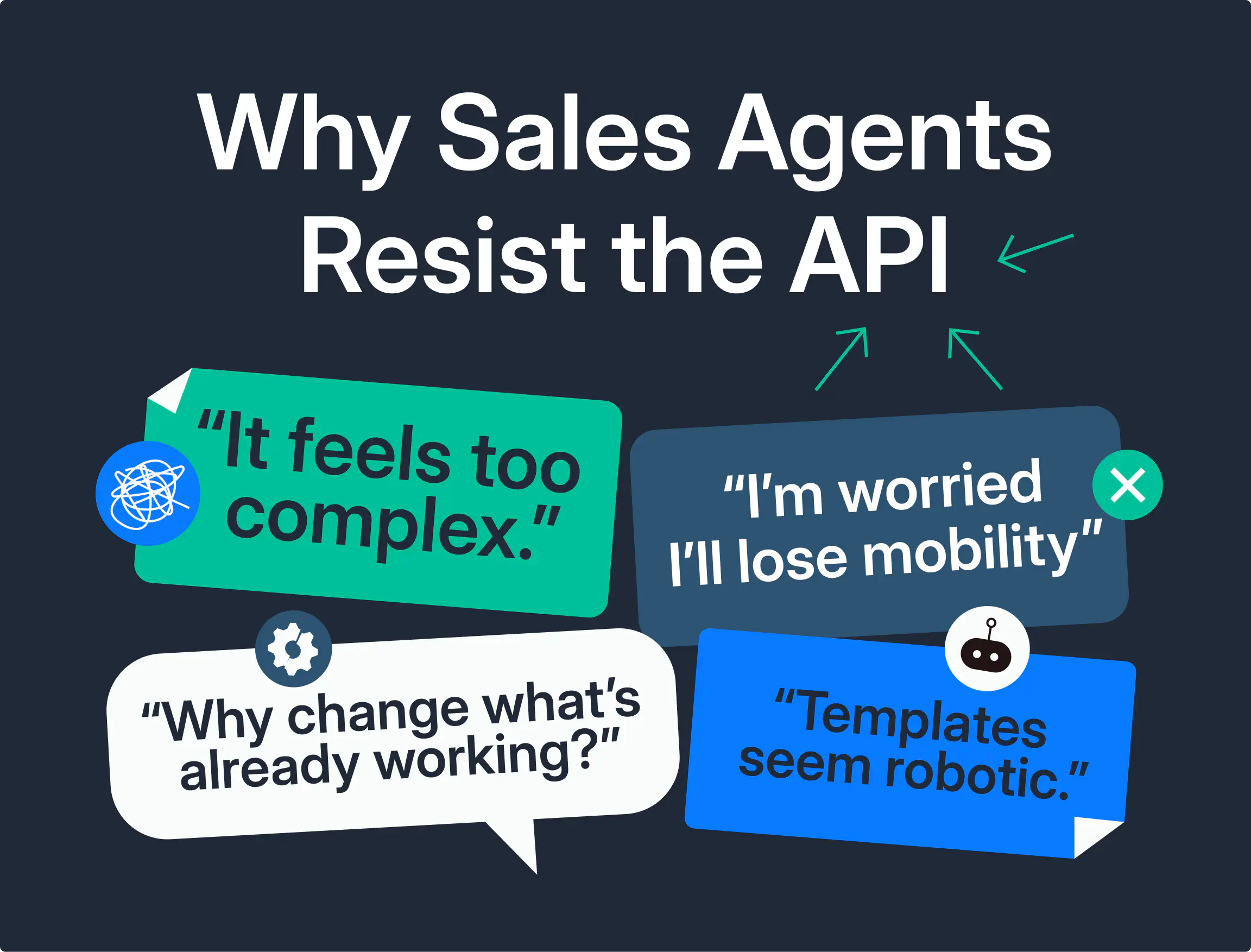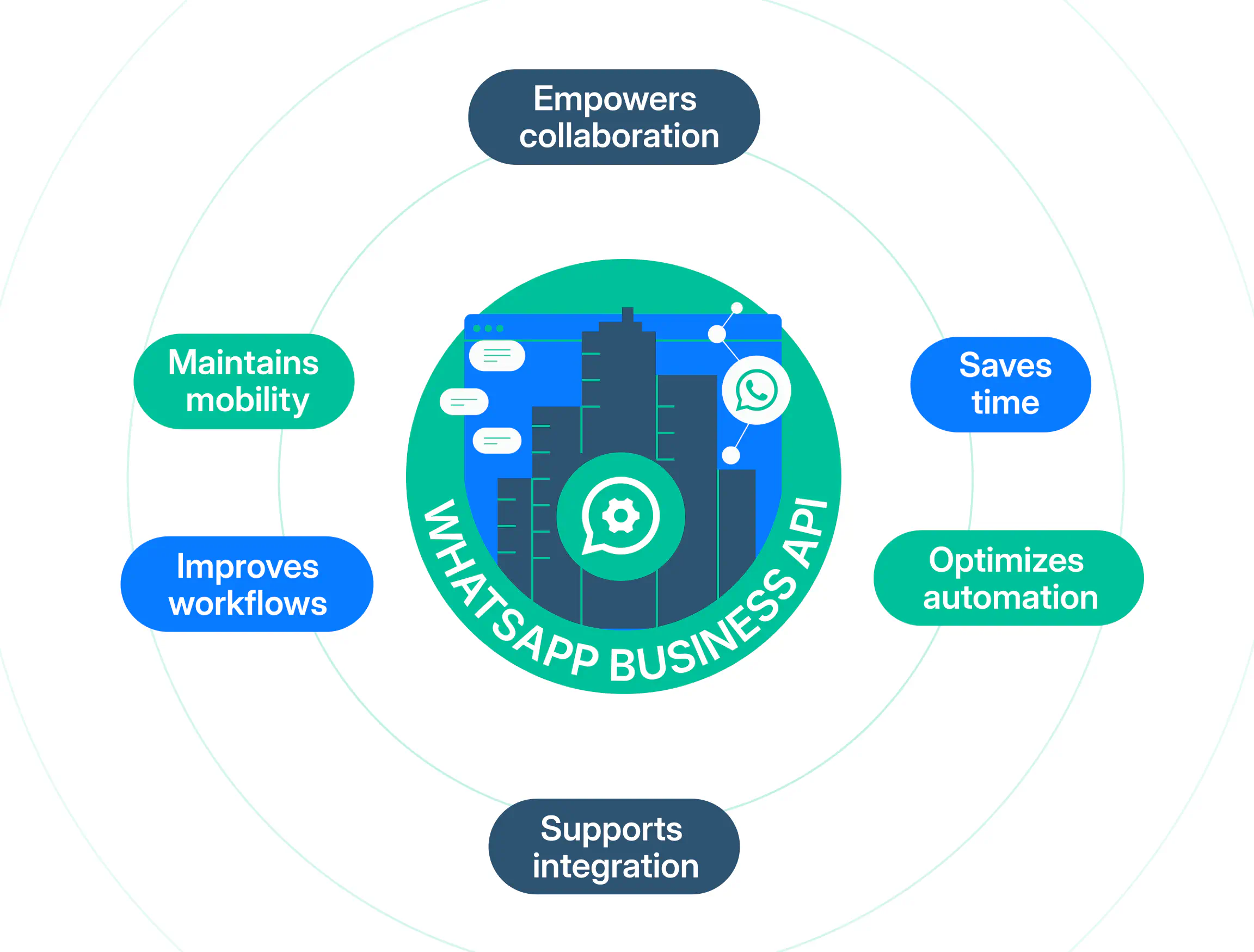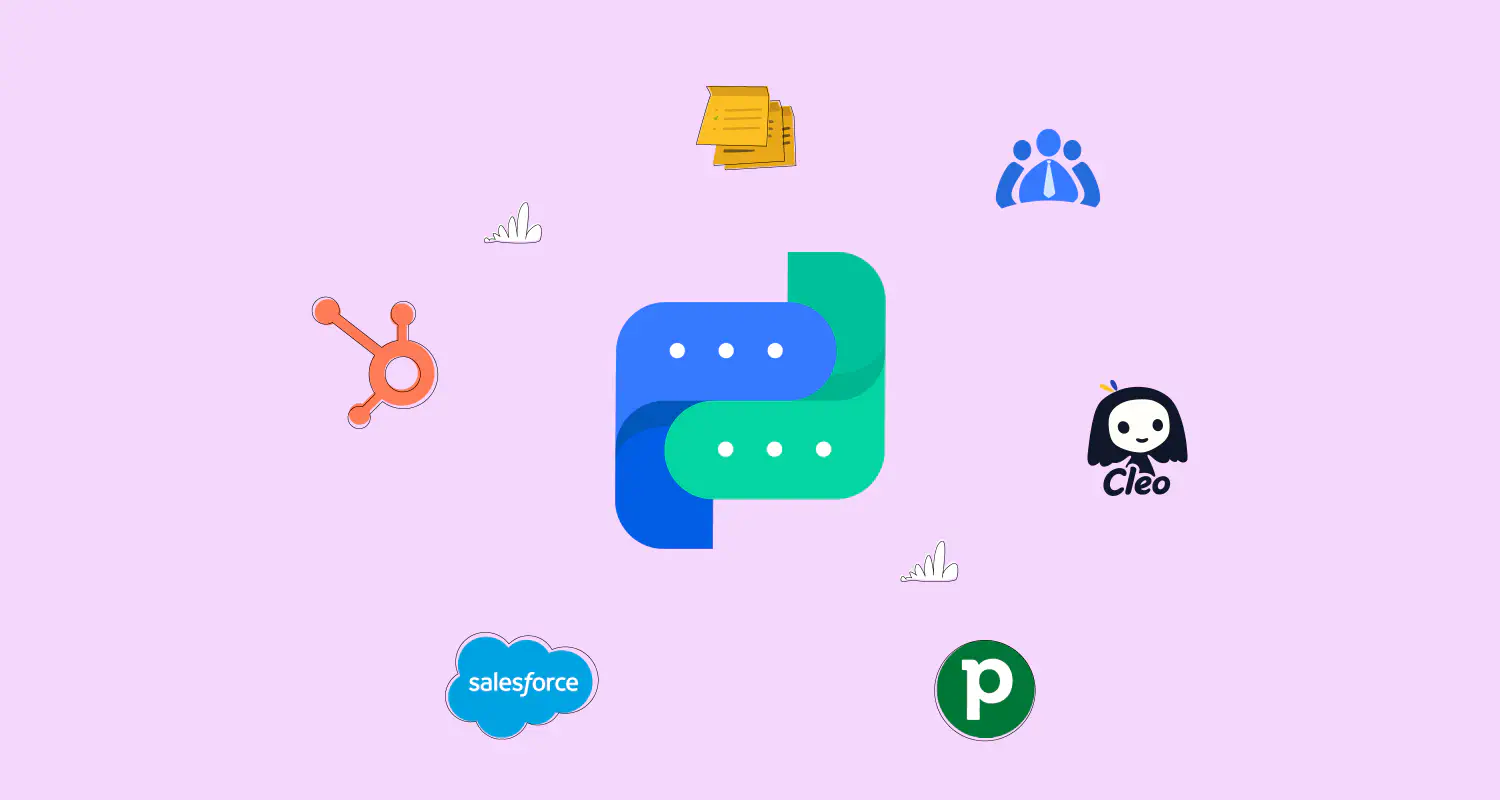Why Sales Agents Resist the WhatsApp API (& Why They Shouldn’t)

Do you feel limited by the WhatsApp Business App when managing your growing list of leads and prospects? As a B2B sales rep or manager, the tools you use shape the results you get—and while the WhatsApp Business App works well for small teams, it starts falling short as operations scale
Sales agents miss follow-ups. Conversations get scattered. Managers lose visibility. And as more leads come in, the pressure grows.
The WhatsApp Business Platform solves these problems with automation, integration, and scalability in mind. Plus, with WhatsApp’s recent update, the switch from the app to the API couldn’t be easier. But despite the advantages, many sales teams still hesitate to make the move to the API.
In this guide, we’ll show you how WhatsApp Business API outperforms the WhatsApp Business app and address any concerns you might have in mind.
Why sales teams resist the switch to Business Platform

Even though the WhatsApp API unlocks serious benefits for teams, many sales agents and managers hold back. Here are some common reasons why:
Fear of complexity
“The platform seems harder to use.”
This is a common concern regarding the WhatsApp Business API. The simplicity of the WhatsApp Business app leads agents to assume the API is overly complex and will make selling on WhatsApp harder.
It won’t. In fact, it’s built to make your day-to-day simpler with automations, team visibility, and an interface that’s intuitive and designed for busy teams.
It’s not the API’s functionality that intimidates most agents. Rather, it’s the thought of adapting to new tools and workflows, especially if they feel the app is “good enough” for their current needs. However, you don’t have to sacrifice the familiarity of the Business app for the API. You can benefit from both at the same time.
Misconceptions on WhatsApp message templates
WhatsApp template messages are a highlight feature of the Business Platform, and yet, many sales agents see them as obstacles rather than handy tools to sell on WhatsApp. There’s a misconception that templates limit a sales team’s ability to communicate naturally with customers, but this isn’t the case.
With variables and custom fields, templates save you time and effort and allow you to focus on building relationships rather than typing out similar messages repeatedly.
Resistance to change
“Why would I change to API when the Business App already works?”
Many sales agents hesitate to use the WhatsApp Business API because they feel the Business app is already doing the job. For those who aren’t using WhatsApp to sell yet, the thought of adopting a new platform might feel like an added complication.
However, the differences in features and benefits between the Business App vs Business Platform are solid ground to justify the change.
Yes, the Business App feels familiar and yes, change can feel risky. But sticking with it too long can cause burnout, inefficiencies, and missed opportunities - especially if you want to grow and scale.
Many sales teams simply don’t realize how powerful the API is when it comes to sales and customer service on WhatsApp. This Lack of awareness is a very common reason for resisting change.
Concerns about mobility
Sales agents often worry that switching to the WhatsApp Business API will tie them to a desktop, limiting their ability to stay connected with customers while on the move. They value the mobile-first nature of the WhatsApp Business app and fear the API might reduce their flexibility.
This concern comes from the belief that advanced platforms are designed primarily for desktop use. For agents who rely on quick responses and constant availability, this is a good reason for hesitation.
The API sounds like a desktop tool, but it isn’t. With the right WhatsApp provider, agents can keep working from their phone while the API works behind the scenes.
Perceived lack of autonomy
Some sales agents worry that features like a shared inbox and team collaboration tools will take away their independence. They fear that their conversations will be visible to others or that they’ll lose control over how they interact with customers.
Shared inboxes aren’t about control, they’re about collaboration. Agents stay in charge of their conversations while being able to loop in teammates when needed.
What does Whatsapp Business Platform offer?

The WhatsApp Business Platform isn’t some complex tool that’ll take you forever to get around, and it isn’t a replacement for your workflow.
Instead, it’s a better version of your current workflow on WhatsApp, one that can make your team much more efficient. Here are some things that WhatsApp API offers to help you sell better over WhatsApp:
The WhatsApp Business API provides a much better user experience and tool stack for growing sales teams than the Business app does.
Thanks to WhatsApp Coexistence model, you don’t have to give up the app if you aren’t ready for the switch. You can keep using the Business App, while the API runs in the background—automating tasks and syncing conversations.
Personalized templates
The WhatsApp Business Platform lets you customize templates so that you can insert variables like names or specific customer details.
You can create templates once, then use them everywhere. Dynamic fields like names and product details make each message feel personal, without having to type them one by one.
In addition to standard templates, there are also quick templates, which improve your workflow, helping you respond quickly and re-initiate conversations after they’ve expired.
Workflow and visibility
Many teams believe that adopting the WhatsApp Business API will disrupt their workflow, but on the contrary, it’ll improve it.
The API allows you to assign conversations, automate follow-ups, and track lead progress, all from one shared workspace.
Instead of spending time managing scattered contacts and repetitive tasks, the platform centralizes everything in one place, making it easier to track and sync conversations. With automation handling routine tasks like follow-ups and message categorization, agents can focus more on selling and building relationships.
Advanced API features
The WhatsApp Business API has advanced features that make it easier for sales agents to carry out routine tasks.
For example, a WhatsApp chatbot can automatically qualify inbound leads by asking key questions and filtering out those who aren’t a good fit. Sales agents don’t need to set it up or manage it. It simply runs in the background, and they can see the entire conversation in the app because it syncs automatically. When a strong lead is identified, the chatbot hands it over to an agent, saving the team time and effort.
The same applies to CRM integrations, which log customer interactions automatically, and campaigns, which send targeted messages to re-engage leads. These tools run quietly in the background, freeing your team to focus on what matters.
Mobility and flexibility
If you don’t want to use the API because you’re worried about losing the convenience of using WhatsApp Business on your phone, don’t be. The Business Platform doesn’t tie you to a desktop or take away your ability to work from your phone.
On the contrary. You can use your phone, your desktop, or both. With the right setup, sales reps keep the same flexibility they love without compromising the efficiency and scalability the API offers.
You can still manage conversations on your mobile app just like you do now, while the API’s advanced features—like syncing and automation—work behind the scenes to keep everything running smoothly. It’s the same flexibility you’re used to, with added tools to make your job easier and more efficient, no matter where you are.
Autonomy with collaboration
The Business platform is designed to give you the autonomy you need while still offering the collaboration tools that help teams work more efficiently together.
With customizable permission settings, only assigned agents have access to their specific chats, ensuring that interactions with customers remain private and under your control. For instance, if you’re working on a lead, other team members can’t access your conversation.
At the same time, the API makes it easy for your team to collaborate through shared tools. Imagine you’re handling a lead and need assistance from a member of a customer support team member. The platform allows your colleague to step in without disrupting your workflow or losing the context of the conversation.
Along with these benefits, comes one crucial aspect that’s exclusive to the Business Platform, building trust with your customers.
This is done through:
The WhatsApp verification badge , which shows next to your business name and signals credibility
Consistent branding and tone across your team, which creates a unified experience & improves customer confidence in your brand.
Customizable templates that help build stronger, more personal relationships.
Success stories of sales agents on WhatsApp API
Here are some examples of sales team members who transitioned to the WhatsApp API and immediately saw the difference in performance.
Sales manager at a SaaS company
A team leader at a SaaS company focused on developer tools was struggling with team communication, as the team was managing outreach across multiple platforms.
After adopting the WhatsApp Business API, the team gained complete visibility over all open customer conversations in one place. The new platform made it easier to follow up with leads faster, automate lead nurturing, and track where customers are in the sales pipeline.
The shared inbox feature allowed the team to collaborate better, reducing response times and increasing overall productivity by 40%. Customer satisfaction also improved due to quicker responses.
Key takeaway: Team collaboration and shared inbox features boosted productivity and customer satisfaction.
Customer service agent at a SaaS company
A customer success agent at an analytics tool provider used to handle client queries through email, which led to slower response times. After switching to WhatsApp via the API, the agent could handle support inquiries directly, offering a more personalized and timely response.
Automated responses for common inquiries reduced manual workload, and within a month, response times were reduced by 60%, resulting in a boost in client satisfaction.
Key takeaway: Using WhatsApp for support provided faster, more personalized service, improving response times and client satisfaction.
Sales agent at a SaaS subscription service
A sales agent at a subscription-based SaaS company was overwhelmed by the repetitive nature of outreach messages. Each lead required personalized follow-ups, but typing the same information over and over was time-consuming and draining.
After adopting the WhatsApp Business API and using personalized templates, the agent could create a set of message templates suitable for different stages of the sales funnel. These templates included placeholders for names, dates, and product details, so each message felt personal and relevant without the need for manual editing every time.
How modern B2B sales teams run
Sales teams are evolving—and so should your tools.
The WhatsApp Business API isn’t just about features. It’s about freeing your team to move faster, communicate smarter, and sell better.
Whether you’re a salesrep juggling leads or a manager scaling a team, this platform gives you everything you need to grow.
So if you’ve been holding off, consider this your sign to take the next step.

Hania is a seasoned researcher and content writer specializing in WhatsApp Business and its role in B2B sales and customer engagement. With years of experience creating in-depth, thought-provoking content, she combines real-life use cases and deep industry insights to help businesses leverage WhatsApp as a growth tool. Her expertise lies in translating complex research into actionable strategies, making her a trusted resource for companies looking to innovate their communication and sales processes.



